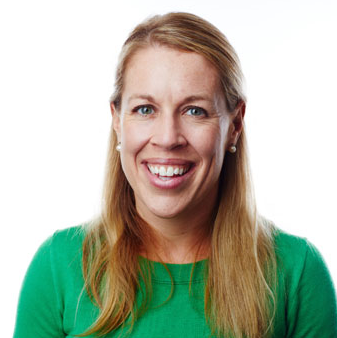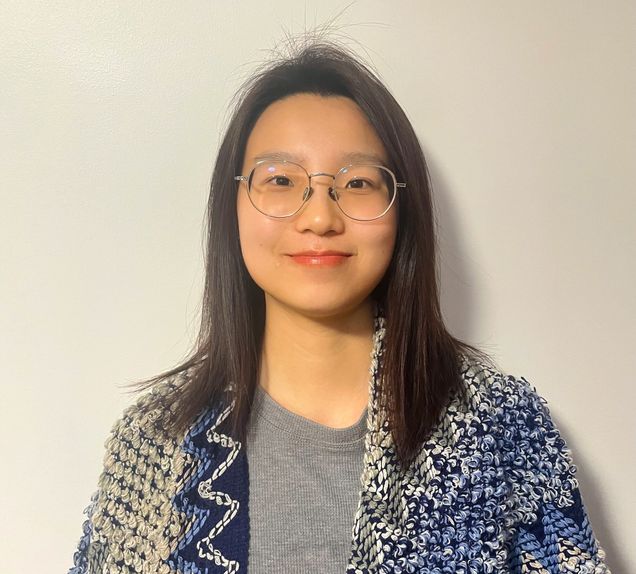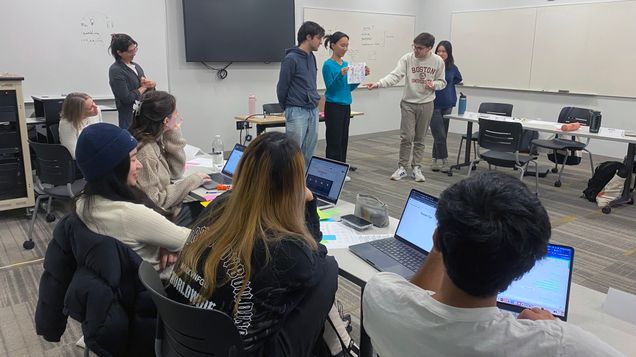Making Internships More Accessible
EL Connector rolls out a for-credit internship course
EL Connector rolls out a for-credit internship course
Last fall, the Massachusetts Executive Office of Veterans Services offered Nayeli Quiles (CAS’26) an internship on one condition: she needed to earn college credit for her work.
“I reached out to everyone to see what I could do,” she says, “because I really wanted the internship.”
Quiles, a political science major, was relieved to learn that the College Arts & 科学 was preparing to introduce a two-credit course specifically for students like her. She accepted the internship and signed up for the brand-new CAS Internship Program (IN 299) for the 2024 spring semester.
CAS Internship Program is a seminar-style, pass/fail course that CAS undergraduates can take in conjunction with on- and off-campus internships. The class is offered through the CAS Experiential Learning (EL) Connector and taught by EL Connector staff. The EL Connector piloted the course last spring with 13 students (including Quiles) who all had off-campus internships and then officially launched the course this fall, adding the option to combine the class with on-campus internship placements. Classwork focuses on communication, leadership, teamwork, professionalism, and other career-readiness topics.
The College of Arts & 科学 launched the EL Connector in 2022 to connect undergraduates to EL opportunities including faculty-mentored research, on-campus jobs, internships, service learning, study abroad, and field trips.

“When I came on board in December 2022,” says EL Connector Director Erin Salius, “I met with lots of CAS students and asked them about lots of things related to experiential learning.”
When Salius asked students what barriers kept them from participating in internships, she heard again and again that there was no college-wide internship course they could register for. “A couple of the majors offer an internship course, but for the average CAS student who’s not majoring in one of those disciplines, there were no courses available to take alongside an internship,” she says.
That was a problem for students like Quiles, whose internships require that they earn course credit for their work. It was also a problem for international students because they must apply to the US government for authorization to work in off-campus internships, and that authorization is only granted for internships that bear academic credit.
“So those two groups of students were really our focus when we proposed this course,” Salius says.

Mathematics and statistics major Elsa Gu (CAS’25), an international student from China, was enrolled in CAS Internship Program in fall 2024 in conjunction with her internship at the Cambridge-based pharmaceutical company Moderna. She’s working as a data analyst with Moderna’s biostatistics team, helping to analyze performance data for the company’s COVID and flu vaccines and working to improve the company’s internal large language model—a digital assistant similar to ChatGPT, tailored for Moderna employees.
The new internship course made it possible for Gu to accept this off-campus internship, and the class is teaching her career skills she knows will be useful in the future.
“We talked about networking and informational interviews last week,” she says, “and we also did elevator pitches.” Giving her elevator pitch to classmates was an excellent way to practice presenting herself and her interests, she says.
Quiles also appreciates what the internship class taught her about how to present herself in a professional space, how to prepare for job interviews, and how to leverage her BU network.
“We had someone walk us through how BU Connects works, and how it’s really similar to LinkedIn,” she says, referring to the University’s networking platform. “I didn’t even know that was something the University offered.”

The internship course is one of four major initiatives of the EL Connector. The Connector also offers a summer internship support program, providing access to campus housing and meal plans for students with Boston-based summer internships; a mentorship program, pairing first-year and transfer students with volunteer upperclassmen who can help them access EL opportunities; and a growing ambassador program. EL ambassadors are students who work 8 to 10 hours each week leading workshops and meeting with other students for one-on-one consultations on all aspects of the experiential learning process.
“We did a big survey last spring to understand where our CAS undergraduates were in terms of awareness about experiential learning and of our office,” says Salius. “Students cited the greatest barrier to accessing experiential learning on campus is that they found out about those opportunities too late to apply. So a lot of our programming—and the ambassador program in particular—is designed to help us address that barrier.”
The ambassador program has proved popular. Salius says her four ambassadors have been so busy with consultation appointments this fall that she’s considering hiring an additional ambassador for the spring.
Salius also has an expansion plan for the internship course, which currently has room for 35 students. Salius co-teaches a single section of the class with EL Connector Program Manager Grace Hymel. If the class grows in popularity, Salius and Hymel can each teach their own section, allowing up to 70 students to take advantage of the class.